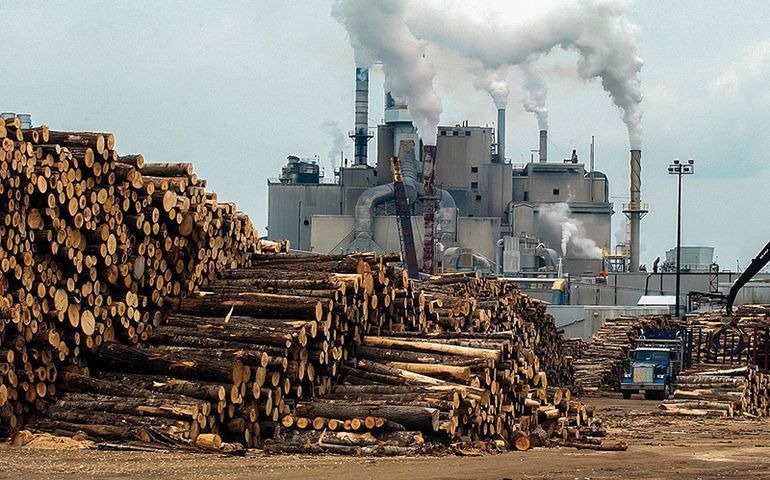Pixelle paper mill in Jay to close, affecting 230 workers
 FILE PHOTO
The Pixelle paper mill in Jay will close in the first quarter of 2023.
FILE PHOTO
The Pixelle paper mill in Jay will close in the first quarter of 2023.
Pixelle Specialty Solutions LLC said its mill in Jay will close in the first quarter of 2023.
The mill employs approximately 230 people who will be affected by the closure.
The mill produces specialty label and release papers, as well as industrial and packaging solutions for ecommerce and food service. Its two paper machines have a capacity of 230,000 tons annually
Pixelle, which is based in Spring Grove, Pa., is the largest manufacturer of specialty papers in North America.
“Economic forces beyond our control have combined to make profitable operations at the mill unsustainable,” Timothy Hess, Pixelle’s president and CEO, said in a news release.
Hess said the company will assist employees by offering employment at other Pixelle locations or providing outplacement support.
The mill has endured significant business and financial challenges that were compounded by the April 2020 rupture of one of its pulp digesters and catastrophic damage impacting the continued operability of the entire pulp mill. No one was injured in the event, and the mill subsequently transitioned into higher-margin specialty products and invested capital to increase operational efficiencies while operating on purchased pulp.
The company said it intends to work with its customers to move production to other Pixelle mills or to plan for volumes of orders in the limited production leading up to mill closure.
Pixelle will continue to manufacture high-quality specialty solutions for its customers at its three specialty mills in Wisconsin, Pennsylvania and Ohio, said David Dickerhoof Sr., vice president of sales and marketing.
“Business conditions and the strength of our broad range of products will offer us continued growth opportunities in serving our customers in the specialty labels, food packaging, industrial specialties and premium printing markets,” Dickerhoof added.
Gov. Janet Mills said she was contacted by Hess on Tuesday about the mill’s closure.
“Since the digester explosion, my administration has been communicating frequently with mill officials to offer our support,” Mills said.
Mills said she asked Hess if there were anything the state could do to prevent the closure “and he said that, unfortunately, there is not.”
Pixelle will offer the Jay employees health care benefits and severance pay following the end of their employment in 2023. Mills said she is directing the state’s labor commissioner, Laura Fortman, to send a rapid response team to provide resources to them and their families.
“Our offices stand ready to connect affected workers with resources that can help provide employment training and job search assistance,” U.S. Sens. Susan Collins, R-Maine, and Angus King, I-Maine, and U.S. Rep. Jared Golden, D-2nd District, said in a joint statement.
Dana Doran, executive director of Professional Logging Contractors of Maine, said livelihoods of members of the trade association will be affected by the closure.
“Before the loss of its pulp digester to an explosion in April 2020, the Jay mill represented about 23% of the pulp market for the state of Maine and was critical to Maine logging and trucking firms and their ability to properly manage forest health,” Doran said. “The decision last year not to rebuild that digester was a huge blow to the industry and the forests, and while very little of the pulp consumed by the mill today comes from Maine, we remain hopeful that a future owner may see the potential it has and create new opportunities for Maine wood fiber.”
Doran said wood pulp is an anchor of Maine’s forest economy, until recently providing a large and reliable market for wood unsuitable for lumber or other high-grade products. The pulp market has also allowed loggers to better manage forest health by making it financially possible for them to selectively thin forest stands to achieve the best long-term outcomes rather than targeting only the largest and straightest trees for saw logs.
Pixelle’s announcement made no mention of whether the company intends to sell the mill.
But Doran said continuing its operation under a new owner makes sense.
“With Maine’s vast forest resource and experienced logging and trucking workforce close at hand, we believe restarting the mill and pulp production in Jay will make good financial sense for a future owner,” Doran said.
Maine’s forest products sector is worth an estimated $7.7 billion annually.
The logging industry contributed an estimated $619 million to the Maine economy in 2017, supported more than 9,000 jobs directly or indirectly, generated $342 million in labor income, and pumped an estimated $25 million into state and local tax coffers.














0 Comments